The best justice money can buy: Donald Trump pursues legal challenges others can't afford
The promise of the U.S. judicial system may be equal justice for all, but former President Donald Trump's flurry of motions and appeals in his criminal and civil cases has shown how much deep pockets can tip the scales.
Nearly all criminal defendants plead guilty rather than fight charges at trial. But Trump's fundraising of tens of millions of dollars has paid lawyers to argue all the way to the Supreme Court that charges in his federal election interference case should be dismissed.
“Everyone is intended to be afforded equal justice, however, the reality is you receive as much justice as you can afford," said Tim Parlatore, a lawyer who represented Trump during the early phases of the classified documents and election interference investigations.
Trump has been indicted on 88 felony counts in four separate cases. He was convicted of 34 counts of falsifying business records in New York.
A federal judge in Florida dismissed 40 charges related to hoarding classified documents after leaving the White House, thanks to Trump's deep pockets funding motions making novel arguments. Those could be reinstated by a higher court, but the process will be lengthy and the outcome uncertain.
Trials are pending on accusations of election interference with four federal counts in Washington and 10 state counts in Georgia, but the Supreme Court ordered a review that could throw out charges in those cases and possibly vacate his convictions.
The bottom line: Despite many of his efforts failing, Trump's legal battles have delayed his remaining trials likely until after the November election.
“Trump‘s apparent limitless resources demonstrate the financial disparities that exist in our criminal justice system,” said Barbara McQuade, a former U.S. attorney who is now a law professor at the University of Michigan. “A well-funded defendant has the luxury of pursuing every defense possible, even taking a flyer on obviously frivolous motions, whereas a defendant represented by a public defender or a low-cost lawyer lack that opportunity because the lawyers are overworked and underpaid.”
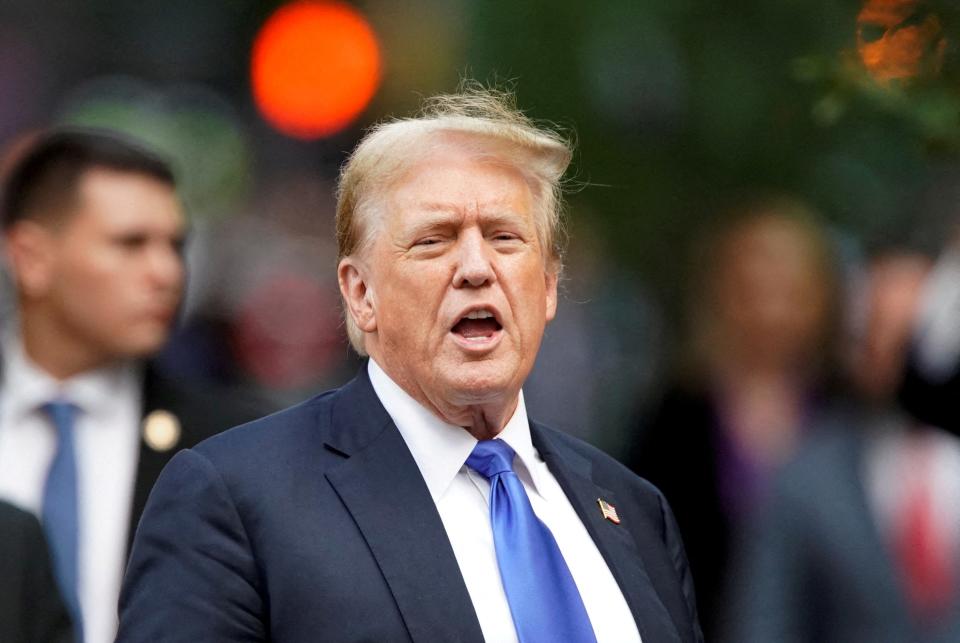
In theory, any defendant could try all of these tactics. But in reality, the costs of paying top-tier criminal defense lawyers like Trump's millions of dollars for aggressive representation would bankrupt almost any other client.
“Sometimes the defendant has to make that horrible choice like: ‘I can only afford to file one motion.' Which one are we going to file?” Parlatore said.
As in politics, money doesn’t guarantee victory. Trump was convicted in New York of falsifying business records to reimburse his lawyer for paying hush money to a porn actress and he lost two civil trials for combined damages of more than $500 million.
But even the cases he lost aren't over, as his appeals continue.
Most criminal defendants plead guilty rather than force a trial
Trump's ability to pay lawyers to mount every possible legal challenge stands in stark contrast to routine criminal defendants.
Nearly 90% of federal criminal defendants ? 64,139 out of 71,887 ? pleaded guilty last year, according to the Administrative Office of U.S. Courts, which tracks federal cases. About 2% of defendants ? 1,564 ? were convicted at trial. Most of the rest of the cases were dismissed with a relative handful acquitted at trial.
Many defendants, even some who are innocent, accept a plea deal to avoid the cost of mounting a criminal defense.
But Trump, in addition to being a self-proclaimed billionaire, has tapped his supporters to pay his legal fees through his Save America political action committee and presidential campaign committee.
“I think the reality is simply that defendants who are well-resourced are going to have an easier time fighting against the government in court and are much more willing to risk going to trial than those who are much more limited financially," said Anthony Michael Kreis, an assistant law professor at Georgia State University.
How much is Trump paying his lawyers?
Trump's Save America political action committee spent more than $70 million on “legal consulting” from Trump’s leaving office in January 2021 through June 30, according to Federal Election Committee records. The spending included:
$13 million to two firms of Christopher Kise, who represents Trump in his New York civil fraud lawsuit and the federal classified documents case.
$8.6 million to Clifford Robert’s firm, which represents Trump in the civil fraud lawsuit.
$6.7 million to Alina Habba's firm, which represented him in the fraud lawsuit and the civil defamation lawsuit brought by columnist E. Jean Carroll.
$6.7 million to Todd Blanche, who represents Trump with Emil Bove in the New York hush-money trial and the federal cases for classified documents and election interference.
$5.4 million to John Lauro, who represents Trump in his federal election interference case.
$1.5 million to Steven Sadow, who represents Trump in his election racketeering case in Georgia.
Fred Wertheimer, president of Democracy 21, an advocacy group for transparency in campaign funding, said if Trump is as rich as he claims, he should be paying for his own legal defense because contributing to his legal defense would be “a hell of a way to buy influence with a person.”
“While this may be all legal, it’s wrong and it basically stinks,” said Wertheimer, who filed an argument in the appeals court against Trump’s claim of presidential immunity.
Trump's campaign and several of the lawyers didn't respond to requests for comment.
Legal experts said Trump's deep pockets allow him to have lawyers make arguments even with little chance of success. Mark Zauderer, a partner at Dorf, Nelson and Zauderer who has practiced in New York for 50 years, said Trump can pitch arguments that help him politically even if they don't succeed legally.
Trump's repeated efforts to have Judge Juan Merchan kicked off his New York case had no chance because his argument that Merchan had a conflict of interest because of his daughter's occupation had been examined and rejected by New York State Advisory Committee on Judicial Ethics. But it was designed to bolster his public claims of political persecution.
Trump sought repeatedly to delay the trial, to prevent witnesses from testifying such as Michael Cohen and Stormy Daniels or to demand a mistrial, and to appeal his gag order. But he was rejected at nearly every turn.
“Trump is able to use those resources not only to launch aggressive litigation tactics but he has demonstrated a willingness to assert things in court through his lawyers that most litigants would not, for fear of offending the court," Zauderer said. “Whether or not that gets any traction in the court, it’s one more opportunity to delay things and kind of throw dust."
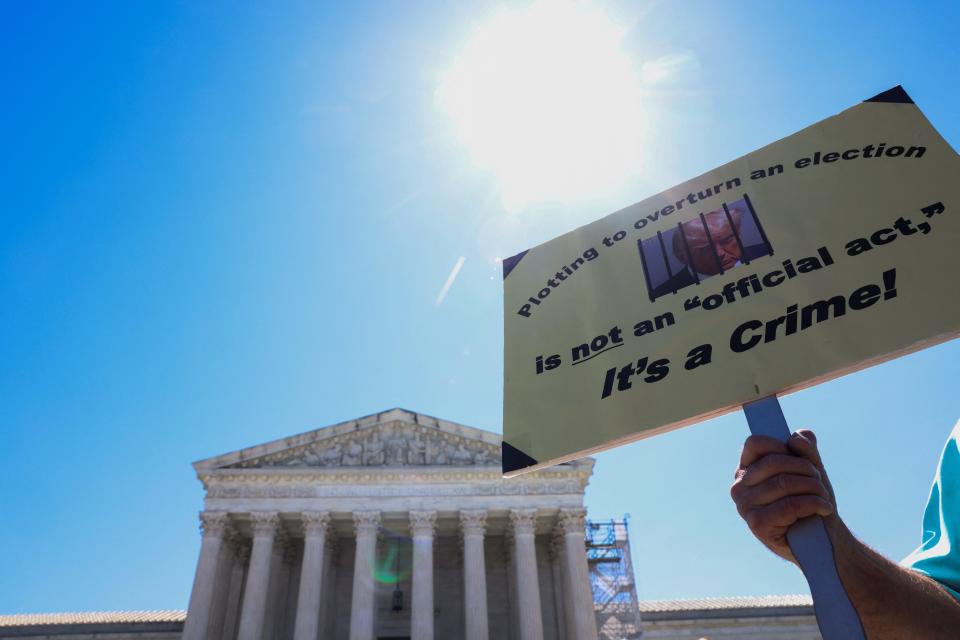
Biggest victory at Supreme Court despite claims about SEAL Team 6 assassination
Trump's biggest victory in all of his litigation was the Supreme Court ruling July 1 that former presidents can't be charged for official conduct while in office.
In each of his four criminal cases, Trump has argued his actions were official business. But prosecutors have argued his efforts to overturn the 2020 election, to retain national defense records after he left the White House and to pay off a porn star to silence her about an alleged affair and conceal the payments were were private actions.
Trump’s two federal trials – on election interference and retaining classified documents – are on hold and his sentencing in the New York hush-money case was postponed as judges in each case review whether charges should be dismissed based on the ruling.
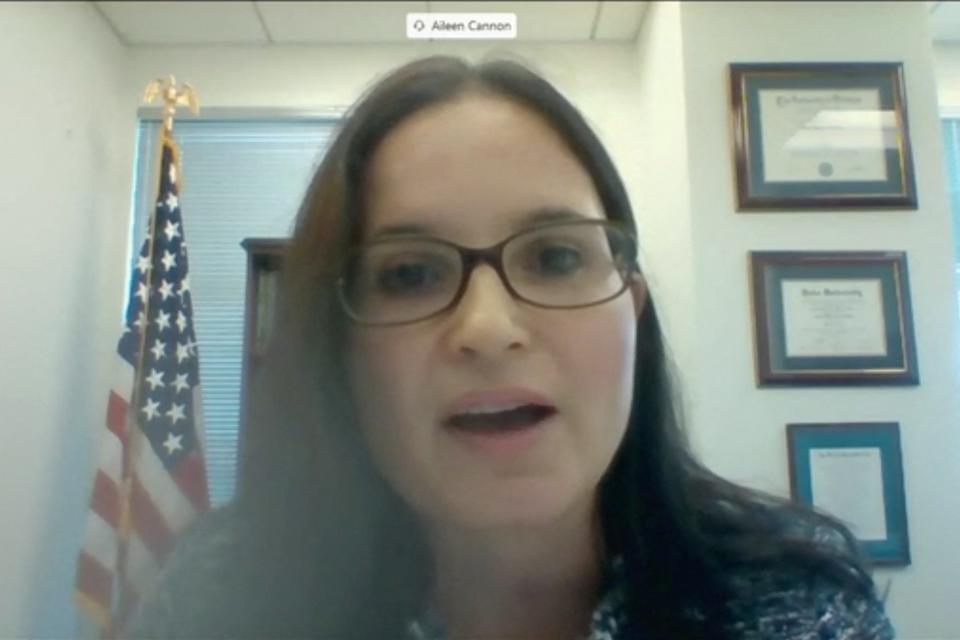
Judge throws out charges Trump mishandled classified documents
Another major victory for Trump was getting his classified documents case dismissed because of how his prosecutor was appointed.
U.S. District Judge Aileen Cannon ruled that Justice Department special counsel Jack Smith’s appointment was unconstitutional.
Legal experts considered Cannon's ruling an outlier because special prosecutors had been upheld for decades in other cases. For example, courts have upheld special counsel appointments repeatedly, including in the cases of Robert Mueller, who investigated Russian interference in the 2016 election, and David Weiss, who prosecuted Hunter Biden. Smith has appealed her decision.
Steve Vladeck, a law professor at Georgetown University Law Center, called the ruling "wrong six ways from Sunday" and predicted it would be immediately appealed.
But Trump's deep pockets allowed him to pursue long-shot motions that occasionally pay off.
“The reality is to properly defend the case, you want to attack every single angle," said Parlatore, who noted that special counsels have been upheld in other federal districts, but not southern Florida.
Unorthodox disputes arose in the classified documents case before charges were filed. After the FBI search of Mar-a-Lago, Trump’s lawyers Cannon to appoint a former federal judge to serve as special master to review thousands of documents.
But the 11th U.S. Circuit Court of Appeals initially overturned the hold on prosecutors investigating the documents and then overturned the special master entirely by ruling the time for Trump to challenge the results of the search would be after charges were filed.
Another advantage Trump brought to the table was his political power. He wasn't just a defendant pleading before Cannon ? he appointed her.
McQuade, the former federal prosecutor, said one advantage to the ruling was that Smith could not just appeal but also ask the 11th Circuit to replace Cannon in the case.
Georgia case on hold as Trump tries to oust prosecutor
Georgia’s highest court will hear arguments in October about whether to remove the prosecutor in Trump's election racketeering case.
Trump joined the fight to remove Fulton County District Attorney Fani Willis from the case because of her romantic relationship with another prosecutor.
Fulton County Superior Judge Scott McAfee ruled in March that Willis could stay on the case if the other prosecutor, Nathan Wade, resigned, which Wade immediately did.
But McAfee rejected Trump’s argument the charges should be dismissed because his claims of election fraud were protected by the First Amendment.
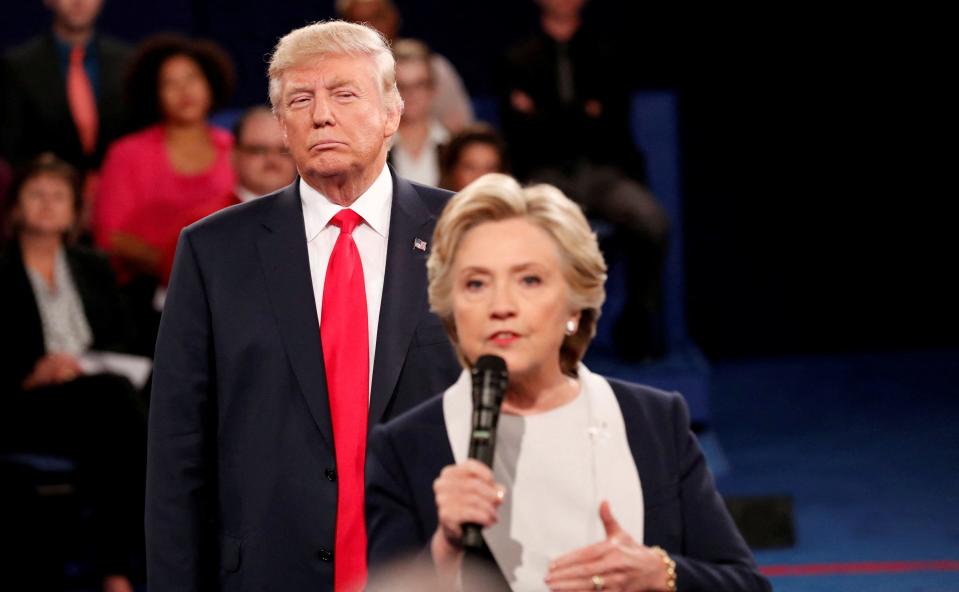
Trump, lawyers fighting nearly $1 million in sanctions over Hillary Clinton lawsuit
Trump is fighting nearly $1 million in sanctions after losing a lawsuit against his former Democratic presidential rival, Hillary Clinton.
Trump sued Clinton and dozens of other defendants in March 2022 citing $24 million in damages over a dossier of unconfirmed allegations against Trump gathered by a former British intelligence officer, Christopher Steele. Steele had been hired by Fusion GPS, a private investigations company, which was paid by Clinton's campaign and the Democratic National Committee. Trump's lawsuit alleged that Clinton and dozens of others “orchestrated a malicious conspiracy to disseminate patently false and injurious information” about him.
But U.S. District Judge Donald Middlebrooks threw out the lawsuit, ruling “this case should never have been brought.” Middlebrooks called the lawsuit "a series of disconnected political disputes" that Trump "alchemized into a sweeping conspiracy." Middlebrooks agreed with Clinton that the lawsuit sounded like "a fundraising tool, a press release, or a list of political grievances" that had no merit.
Clinton and 17 other defendants sought sanctions for the frivolous lawsuit and Middlebrooks awarded them a combined $937,939 for legal fees and costs.
Trump and lawyers including Habba are appealing the dismissal of the case and the sanctions at the 11th U.S. Circuit Court of Appeals.
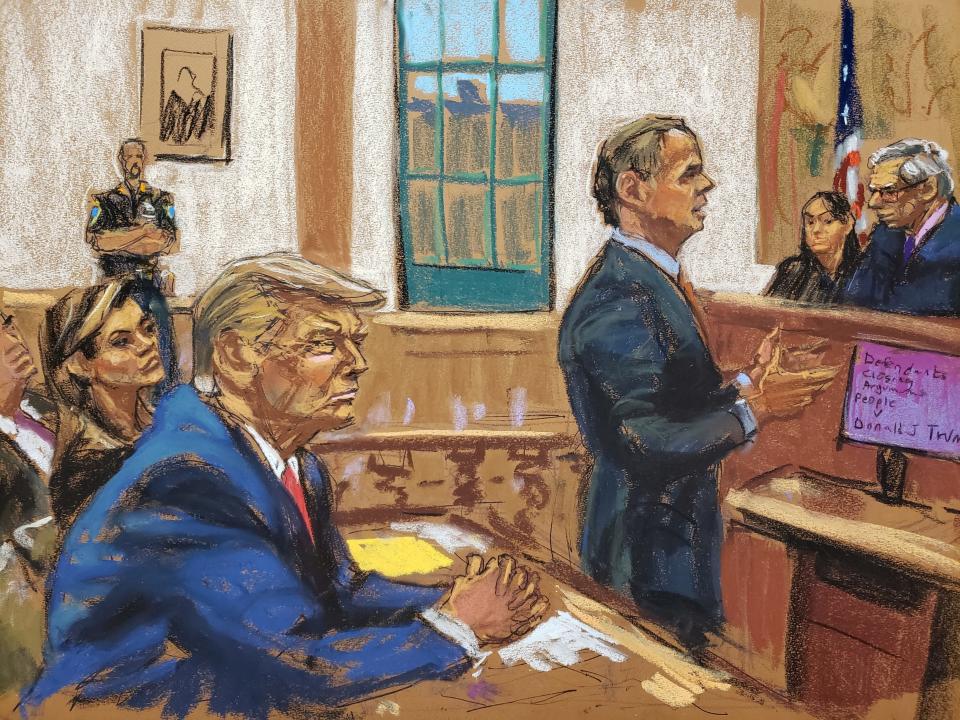
NY judges fine Trump for contempt for violating gag orders
Another way Trump's money changes the rules he plays by is that he can easily afford the standard fines for violating gag orders, which are intended to protect court staff and witnesses from intimidation.
Trump posted a picture of Engoron's law clerk, Allison Greenfield, that falsely accused her of being Senate Majority Leader Chuck Schumer's "girlfriend."
Engoron, who had a bomb threat called into his home during the civil fraud case, fined Trump a combined $15,000 for violating his gag order against commenting on his clerk.
Trump also posted criticism repeatedly about his former lawyer, Michael Cohen, and porn actress Stormy Daniels, who were key witnesses in his hush-money trial. Merchan fined Trump $10,000.
"Weigh that against the political benefit he gets publicly, politically promoting himself as the victim," said Zauderer, the longtime New York lawyer. "How many people can just pay $10,000 or $20,000 out of their pocket just to thumb your nose at the court?"
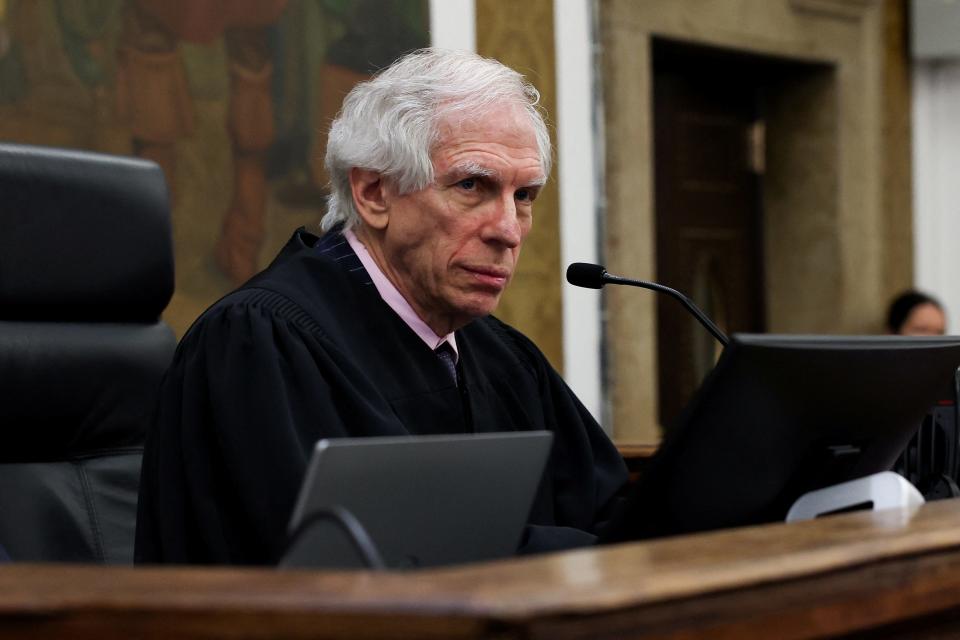
Trump's lawyers are sometimes scolded for their advocacy
When Trump lawyer Cliff Robert asked Engoron to pause the enforcement of the $454 million judgment in Trump's civil fraud trial, the judge refused.
“You have failed to explain, much less justify, any basis for a stay,” Engoron wrote.
In the hush-money case, Trump's lawyers argued repeatedly that former lawyer Michael Cohen shouldn't be allowed to testify because of his previous convictions for perjury. But Merchan ruled Cohen hadn't been shown to be lying in the latest case.
“Rearguing this Court’s prior rulings in this manner is procedurally and professionally inappropriate and a waste of this Court’s valuable resources,” Merchan wrote in denying the request for a second time.
Another dustup occurred when Blanche told Merchan that Trump was trying to obey the gag order restricting his comments about potential witnesses and jurors.
"Mr. Blanche, you’re losing all credibility," Merchan said.
This article originally appeared on USA TODAY: How Donald Trump uses supporters' money to delay his trials